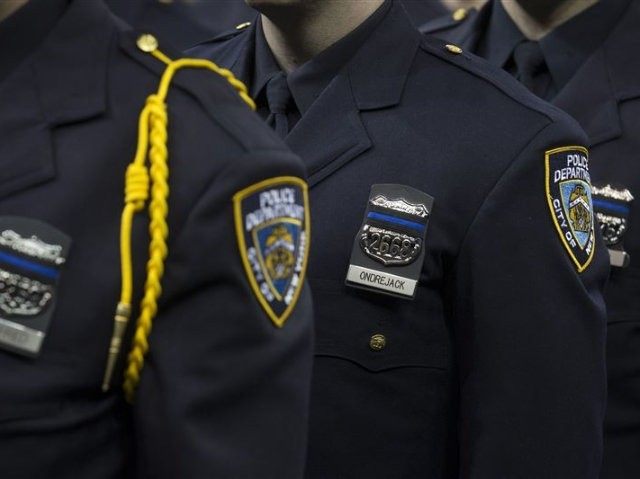On his radio show, retired NYPD officer John Cardillo discussed explosive new details in the Sam DuBose case with Breitbart homepage editor Katie McHugh.
Cardillo began the interview by wondering why the deaths of police officers are either underreported or swept under the rug, even as the ambiguous shootings of a black criminal by a white police officer become “global headlines.”
“What concerns me is this coddling, downplaying of unacceptable, inexcusable criminality,” McHugh said. “You see with Sam DuBose… People tried to make it out like, ‘Oh, a police officer shot him point-blank for having a joint.’ And it’s just not the case. Your sources in the police departments found there was two pounds of marijuana — that’s at least a fifth class felony for possession in Ohio — and of course much more if he intended to sell it.”
“And really, you just have to put yourself in this person’s shoes and ask: What do you think would police would do if I, you know, ignored them when they asked for my driver’s license, if I handed them a bottle marked ‘gin’ instead, and I refused to get out of the car? What do you think would happen to you?” McHugh continued.
Cardillo slammed the prosecution targeting Officer Ray Tensing, who fired one shot after DuBose tried to drive away.
“One of the things that infuriates me, is: DeBose had two pounds of weed,” Cardillo said, “and we now know, $2,600 in cash… The prosecutor’s office was, I feel, doing all they could do to conceal this information. To avoid this information coming out. The prosecutor’s public statement was: ‘Well, he had some weed,’ or something to that effect. ‘He might have had some marijuana.’ And that’s very different than having two pounds, because I think the implication there is that it was a joint.”
“Now, more importantly, what really drove me over the edge, was: Officer [Sean] Bolton was killed over 1.7 grams of marijuana. He interrupted a 1.7 gram deal.”
Cardillo added that according to another police source, cops unloaded another pound of pot: “This went from a routine traffic stop, to evasion of a felony arrest, and also, weaponized a vehicle. Am I going too far?”
“Well, no, I think it’s reasonable that Ray Tensing could have thought he was being dragged,” McHugh said, “because Sam DuBose decided to take off, while the officer was speaking to him.” She added that since President Obama spoke favorably of Trayvon Martin in 2012, there appears to be support for criminals in high places. Cardillo emphasized how routine calls could become very dangerous, even deadly for police officers very quickly, and how their deaths are ignored by a media that softens the records of career criminals:
A very dangerous call for police officers — because we all are lackadaisical about them — are alarm calls. We saw this in the death of officer Thomas LaValley in Newport, Louisiana. Got a call from burglary to a residence, which often do turn out not to be much. Either the perps are gone, or it was a burglar alarm activated by a cat or a resident who forgot their coat, but unfortunately, that wasn’t the case here. Officer LaValley walks up, and he’s blown away as well by another career criminal, a savage.
“What really struck me about this one wasn’t just the under-reporting by media. But Officer LaValley had been a news cameraman, prior to becoming a police officer. And the media didn’t even look after one of their own.”
Cardillo pointed out that most Americans don’t know LaValley’s name, and hours after his death, there was a mere handful of mentions about him on Twitter — whereas there were thousands about criminals, some of whom killed other cops. He and McHugh pivoted to the new Christian Taylor case, where a 19-year-old black man drove his car through the front of a car dealership late at night, struggled against police responding to the call, and was shot dead by a white officer.
“Let me read you the headline on the Detroit Free Press,” Cardillo said. “‘Texas officer on burglary call shoots unarmed black teen,'” pointing out that other reports called him a college football player or star. “Aaron Hernandez and O. J. Simpson were football stars, you morons. This narrative — they’re trying to make this kid out to be a saint. Like you said — drove his car through the dealership window, then began fighting with police.”
“And he’s not unarmed,” McHugh added. “A vehicle is a deadly weapon… It’s pretty egregious, too, slamming your car through the front of a car dealership. You’re not ‘unarmed’ when you’re driving a vehicle that weighs several tons.”
Cardillo agreed, bringing up another case in Maryland that was nearly identical to the DuBose one. A man decided he didn’t want to be stopped by police. “If you read the details of this case, he did movement for movement exactly what DuBose did.” But this time, the officer’s arm was caught in the seatbelt, and he was dragged by the man who was trying to escape — and despite the remarkable similarity between the two cases, the media buried it.
The media decided to declare “a war on cops,” McHugh replied. In a country with over 300 million people, altercations with police are bound to happen. But the media are “doing their best to make this a dramatic new ‘civil rights’ narrative, whenever it’s simply violent people who decide they’re not going to cooperate, and in some cases, kind of get what’s coming to them. I couldn’t imagine, myself, refusing to provide identification for a police officer, and then trying to drive away while he’s speaking to me.”
“Would it even cross your mind?” Cardillo said. “If I had never been a cop, that would never even cross my mind.”
LISTEN (Beginning at approximately 33 minutes in):

COMMENTS
Please let us know if you're having issues with commenting.